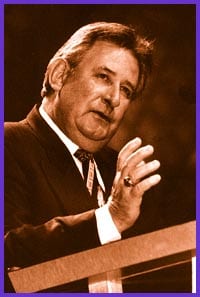Less than a year after their last fight with the province over basic human rights protection, Alberta’s gay men and lesbians face another political battle that could prove to be “explosive.”
“Here we go again,” says activist Murray Billett of Equal=Alberta.
On Feb 25, Premier Ralph Klein’s Tory government tabled a bill that specifically excludes same-sex couples from the definition of a common-law union.
The Domestic Relations Amendment Act defines a common-law relationship as one “between two people of the opposite sex.”
It’s a change to the Domestic Relations Act which outlines spousal support rules.
Last year, the Alberta Court Of Appeal ruled the act is unconstitutional because it applies only to married couples who separate.
The government insists it’s not trying to discriminate. A spokesperson for the premier says: “We’re dealing with a narrow ruling that dealt only with heterosexual relationships breaking up.”
But Billett calls that “nonsense.”
“They could have defined common-law and not put a definition of spouse,” he says. “But they intentionally carved [gay men and lesbians] out.”
Billett says Alberta is “testing the waters” with the bill to gauge public opinion on how far the populist government can go in limiting gay rights.
A confidential government poll that was leaked last week suggests Albertans are evenly split on most gay issues.
“[The bill] has the potential to be divisive and explosive,” says Billett.
Calgary gay activist Stephen Locke agrees the proposed legislation is a litmus test of public opinion. “There’s an agenda at work here. They’re going to fight rights for gays and lesbians tooth and nail,” Locke says.
Gay men and lesbians aren’t the only critics of the move.
Gary Dickson, the opposition Liberal house leader and human rights critic, says it’s “foolish” to introduce this bill because it’s expected the Supreme Court Of Canada will rule soon that spousal support provisions should apply to same-sex couples (in a case known as M versus H).
“This provincial government has already squandered tens of thousands of dollars on the courts,” Dickson says.
Last April, the Supreme Court Of Canada ordered Alberta to include sexual orientation in its human rights legislation after ruling in favour of Delwin Vriend, an employee of a Christian college who was fired because he’s gay.
To appease members of his government outraged about the ruling, Klein set up a ministerial task force to find “legislative fences” that would prevent the Vriend decision from expanding gay rights.
The recommendations of the task force will be debated in a closed-door caucus meeting Thu, Mar 18. The move is odd, however, given that Klein told delegates to the recent United Alternative that an amalgamated rightwing movement should not attempt to legislate morality.
“Why do they continue to try to legislate discrimination?” asks Billett. “We’re tired of having to fight this fight, but we can’t afford not to take them on.”
Billett says his group’s members have decided it is premature to begin a legal challenge. Instead, they’re hoping the Supreme Court’s ruling on spousal support provisions will kill the bill.

 Why you can trust Xtra
Why you can trust Xtra


